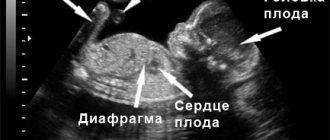Causes of depression during pregnancy
"You are pregnant!". Over the next nine months, you “should” be a happy, smiling mother, immersed in sweet worries, surrounded by attention, love and reverent attitude from the whole world. The idyllic picture of a woman carrying a child has little in common with reality.
During this period, the hormonal system provokes the emergence of pathological emotions; long-ignored problems begin to fill the living space at a catastrophic speed, not to mention serious trauma (loss of a loved one, breakup with “father”).
Even happy women (with a prosperous family and material situation) undergo emotional storms, exploding for any reason and falling into states of hopeless blackness. Those mothers who find themselves in a difficult life situation (unplanned child, absence of a husband, poor financial situation) will almost certainly perceive their pregnancy as unwanted, and their life as unsuccessful and unsuccessful.
So, depression during pregnancy can be triggered by the following reasons:
- unsuccessful pregnancies in the past that resulted in miscarriage;
- severe previous pregnancy with multiple complications;
- psychophysical problems (hormonal imbalance, severe toxicosis, changes in appearance);
- poor financial situation in the family;
- lack of warmth and support from the husband or his absence;
- psychological traumas of the past (domestic violence);
- untreated depression in the mother or other family members (relatives, close people);
- unplanned pregnancy.
Any stressful situation in the present or past can lead to the development of one of the most severe psychoneurotic disorders. The disease, in principle, can affect every person – even those who are mentally stable and endowed with a strong immune system against stress. It’s not for nothing that the problem is being discussed today in the context of the most dangerous neurotic syndromes and is emerging as a “leader” among them.
A pregnant woman is particularly sensitive, suspicious, and anxious—the specificity of her “situation.” Mom is not so much in a state of euphoria from the imminent birth, but rather preoccupied with a million other issues related to the situation. An already tense situation can explode at the slightest provocation. And life has many reasons. There is only one “reason” – our human psyche, which develops and is formed under the influence of countless conditions.
It must be remembered that a depressed husband or any other loved one in this state is “contagious.” It has been established that neurosis tends to be “transmitted” among emotionally close people. Therefore, during an examination, it is so important to establish the correct picture, to discover the true cause, and not to use generally accepted formulas.
Etiology of the pathological syndrome
Prenatal depression is influenced by a woman's inner world. Numerous worries about pregnancy in the early stages, awareness of her role in the future life of the baby and other circumstances force the expectant mother to immerse herself deeply in her thoughts. If resistance to stress is zero, the risk of developing a pathological condition increases.
During pregnancy, a woman may experience depression under the influence of internal and external irritating factors:
- stress against the backdrop of an unexpected “interesting situation”,
- poor living and social conditions: lack of own living space, negative home environment, lack of support from loved ones),
- financial instability: loans, loss of regular income,
- reluctance of relatives or spouse to have a child,
- difficult pregnancy: risk of pathologies in the embryo, toxicosis, unbearable weakness,
- hereditary predisposition to depression,
- constant miscarriages, exhausting infertility therapy,
- dysfunction at the hormonal level, especially the thyroid gland,
- suffered a psychological blow,
- long-term treatment with sedative or psychotropic medications.
The development of depression during pregnancy can be observed under the influence of negative heredity, physical or psychological abuse, or other emotional shocks. In each individual situation, the pathogenesis of the pathological condition is individual and treatable.
What symptoms should you pay attention to?
Depression during pregnancy can manifest itself in different ways. Some women constantly cry, some cannot sleep, some are afraid of the future, driving themselves to suicide attempts with their fears. However, there are a number of signs by the presence of which one can judge the presence of depression. Among them:
- Increased irritability
- Anxiety
- Inability to concentrate
- Feeling hungry or lack of appetite
- Constantly feeling tired
- Dejection
- Fear of going outside
- Suspiciousness
- Persistent drowsiness
- Low self-esteem
- Feeling hopeless and joyless
- Feeling guilty
- Lack of desire to communicate with anyone
- Diffidence
- Tearfulness
- Sleep disturbances (inability to sleep, nightmares).
Alarming manifestations
Everyone knows that the mood and emotional state of a pregnant woman is changeable. The systems of the female body are rebuilt to carry a child, ensure its successful course, and configure the mother’s body for the upcoming birth. The nervous system is also completely rebuilt, the so-called “dominant pregnancy” is formed.
But there are a number of signs that are alarm bells for the expectant mother and her loved ones:
- feeling of sadness, emptiness, apathy;
- previously enjoyable activities and hobbies do not bring the same joy;
- loss of strength, drowsiness, lethargy;
- inability to concentrate, remember, make decisions;
- lack of appetite;
- excessive appetite, “eating” experiences;
- lack of sexual desire;
- sleep disturbance (insomnia, night awakenings, excessive sleepiness, nightmares);
- feeling of uselessness, helplessness;
- reluctance to communicate with family, colleagues, desire for loneliness;
- thoughts of death or suicide;
- tearfulness, aggression, irritability;
- vague pain that cannot be treated.
Additionally , depression can be suspected if five or more of these symptoms persist for more than two weeks.
In addition to this simple method, there are a huge number of tables and tests:
- Beck scale;
- Zung scale;
- Hamilton scale;
- Edinburgh Postnatal Depression Scale;
- Self-rating depression scale and others.
A pregnant woman can pass all these tests on her own, but it is better if a specialist psychologist or psychotherapist helps do this.
Signs of depression in early and late pregnancy
I will list a few obvious manifestations of prenatal illness:
- poor sleep, insomnia;
- loss of interest in hobbies and people around you;
- constant torment of conscience;
- loss of appetite;
- rapid energy consumption, which leads to fatigue;
- difficult to focus;
- feeling of restlessness;
- irritability;
- slow reaction;
- thoughts about suicide.
Women expecting the birth of a child often experience sudden mood swings from joyful to depressed. Diagnosing a psychological illness in a girl is quite difficult, since some symptoms indicate normal behavior, which can often manifest itself in non-sick people. To identify the disease, you should contact a specialist. Sign up for my consultation, I will help you cope with this problem, I will give valuable advice on how to deal with depression, depression and depression during pregnancy.
Depression in the last weeks of pregnancy
The highest point of manifestation of depression is just the moment before childbirth, in the last stages. The girth of the abdomen reaches its maximum, the pregnant woman has no opportunity to fully rest. The focus of thoughts comes down to a speedy birth and the end of all the torment associated with pregnancy. Often this condition is aggravated by the fact that relatives and friends are bombarded with questions of this kind: who are you waiting for, and when will it happen?
Statements by psychologists say that depression at this stage does not harm the health of mother and baby. Remember that the stress that the baby will endure during development in the womb can perpetuate his inability to solve problems in later life. According to observational data, it was revealed that children who have suffered stress develop worse in childhood and lag behind their peers.
We also recommend reading: Swelling of the mammary glands in newborns
You should always remember that the calmer the mother is on the eve of childbirth, the easier the birth itself will be. Spend precious minutes doing things that bring you joy and pleasure, rather than transferring your emotions to negativity and its manifestations. You will still need strength to meet your baby.
Always remember that pregnancy is not only euphoria and a holiday for a period of forty weeks, but also a period during which negative thoughts and emotions often arise. It is not without reason that it is recommended to go on maternity leave on time, without burdening yourself with work before the onset of labor. Without a doubt, a familiar lifestyle helps the expectant mother delay the realization of her radically changed life.
Having a familiar job, friends and co-workers, and recognition of importance will help to avoid depression at first, but at the same time, you need to remember about rest, which means it’s time to go on vacation and prepare more carefully for motherhood. The sooner you realize that the main worries will still fall on your shoulders, the easier it will be for you to avoid the pressure of a suddenly dropped load.
If depression is not dealt with in time at this stage, it can develop into hysteria. Increased nervousness will occur due to a huge belly and your own resemblance to a clumsy duck, the inability to sleep properly due to suffocation, or eat well (the child will put pressure on the stomach, and you will suffer from heartburn).
Thoughts about an imminent birth, like an annoying swarm of flies, will constantly disturb the expectant mother and any little thing can cause concern about the condition of the baby. It's impossible to prepare for every situation, but remember that anxiety is also normal. In the ninth month, almost everyone notices the slowness of time. Courses for pregnant women, walks, hobbies, communication on thematic forums, support for pregnant women and established mothers, and so on are intended to help them come to terms with the slow-moving expectation.
Differences between depression and bad mood
A bad mood is a short-term period of reluctance to perceive the surrounding reality. Expressed in negative reviews specifically about the irritating factor. Depending on individual vulnerability, the spectrum of negative feedback from a pregnant woman may expand.
Under the influence of positive factors, normalization of lifestyle, achievement of the desired - this condition quickly passes.
Threats to commit suicide most often remain at the level of verbal warnings, without developing into something more. The appetite is not only present, but also significantly enhanced - the pregnant woman “eats” the problem, distracting herself from thinking about the annoying factor and delighting herself with delicious dishes.
Depressive syndrome is deeper and more protracted. It can rarely be confused with just a bad mood.
It is characterized by the following features:
- A pregnant woman limits communication.
- Refuses food.
- She has difficulty concentrating.
- Drowsiness or, conversely, insomnia.
- Loss of interest in activities that you previously enjoyed.
- Recurrent thoughts of death, suicide, or an obsessive feeling of hopelessness.
- Anxiety.
- Feelings of guilt or worthlessness.
- Over time, headaches and stomach problems appear that do not go away.
- Doesn't attend antenatal clinics.
- Do not follow the gynecologist's recommendations.
- Knowingly uses harmful substances such as tobacco, alcohol or drugs.
- She often tries to get rid of pregnancy using various methods.
Self-help measures for depression
What can a pregnant woman do to alleviate her condition?
- Avoid stress. Any strong experiences during this period will lead to the progression of the disease.
- Limit yourself from negative information. Don't watch the news, don't read the newspapers. Avoid communicating with people you don't like.
- Don't make important decisions. Put off all serious matters until you recover.
- Take care of yourself. Pamper yourself with gifts, create a good mood in any way available to you.
- Eat tasty and healthy food. Do not forget that there is a small creature living inside you that needs nutrients for normal development and growth.
- Move more. Gymnastics or yoga classes, swimming, walks in the fresh air are what you need during this difficult period.
- Communicate with relatives and friends. Invite guests to your place or visit your loved ones yourself. Don't hide from the world in your depression.
- Do not drink alcohol - alcoholic drinks will worsen your condition and also harm your growing baby.
- Find something you like. Knit, sew a trousseau for the child, paint, write letters - anything to keep yourself busy and enjoy life.
- Don't be afraid to talk about your problems and experiences. Share everything that is on your soul with your husband, loved ones or your therapist.
Following these recommendations will allow a pregnant woman to maintain peace of mind and quickly cope with depression that arose during this difficult period of her life.
Tags: pregnant, do, depression, if
About the author: admin4ik
« Previous entry
Depression during pregnancy: first trimester
Depression often develops in the 1st trimester of pregnancy, when hormonal levels change, mood changes, and health worsens. The woman constantly feels drowsiness, weakness, nausea, and becomes irritable. Depression in the first trimester of pregnancy is manifested by the following symptoms:
- Tearfulness.
- Feeling depressed.
- Increased sensitivity.
- Nervousness, irascibility.
- Insomnia.
- Bad mood.
- Fast fatiguability.
- Drowsiness.
- Constant anxiety, feeling of fear.
- Decreased cognitive function.
- Apathy.
- Headache.
- Pessimism.
- Low self-esteem.
- Poor appetite.
If depression develops during pregnancy, the first trimester of pregnancy is under the supervision of a psychiatrist. A pregnant woman's mental disorder can negatively affect the condition of the fetus. In the first trimester of pregnancy, the baby's organs and systems are formed; any negative factors can cause developmental disorders. The development of depression can be caused by various stressful situations: a child was unwanted by one of the spouses, a husband left the family, a woman was left without work and financial support. Mental disturbances can be caused by the following factors: changes in previous lifestyle, refusal of active sports, refusal to travel. Women prone to depression in the first trimester often decide to have an abortion.
How to treat depression in a pregnant woman?
Depression is not a description of a mood, but a dangerous condition that can be conditionally considered a disease, because it can be treated with medications. Of course, pharmaceutical products are prescribed only in advanced cases.
At the first signs of depression, a woman should consult a psychologist. Sometimes it is difficult for a woman in labor to detect this condition in herself, and her husband or close relative should insist on a visit to a specialist.
After the examination, the psychologist will choose a suitable method for correcting the emotional background. These could be hypnosis sessions, art therapy, or special tasks that will help determine what causes a woman’s depression. Then meetings with a psychologist will be aimed at stabilizing the mental state, which is achieved through awareness and acceptance of one’s own situation.
For severe forms of depression, drug treatment is prescribed. A psychotherapist does not have the right to prescribe potent drugs, but both a psychotherapist and a neurologist can prescribe antidepressants.
If a woman notices that her mood is predominantly bad, she should not isolate herself from the outside world, but try to discern all its charms. To do this, you should find a hobby or interest, see and communicate with friends more often, go to various events, and spend more time in nature.
Under no circumstances should you keep your emotions to yourself. If something bothers you or worries you, you need to tell a loved one about it; during emotional outbursts, you are allowed to cry, laugh, and break dishes. In extreme cases, when you really want to talk to someone, but are not afraid of being judged, you can call the psychological support hotline.
If the condition persists, you need to urgently go to a psychologist. The soul also requires attention, just like the skin, the stomach, and any other organ.
We suggest you read: Can pregnant women sleep on their stomach?
Calling any sadness depression is incorrect because this term is medical and means a serious personality disorder. Prenatal depression is not a normal condition and should be monitored by a psychologist because it can be difficult to distinguish from normal pregnancy anxieties and worries.
It is difficult to establish for certain the onset of a psychological disorder, but it is possible to suspect the formation of one based on some characteristic symptoms. One of them is a woman’s reluctance to take care of herself. A pregnant woman does not strive to look good, ignoring basic hygiene rules.
Also, a depressed woman demonstrates indifference to the development of her child. Non-recognition, reluctance to own pregnancy is one of the reasons for such a distant attitude towards it.
A psychologically healthy expectant mother, with great and understandable enthusiasm, re-reads literature on child care, delves into the details of communication with the baby, consults with a specialist about what tactics to follow so that the child grows up healthy, and in every possible way fills existing gaps in knowledge.
Tearfulness is also one of the characteristic signs of depression during pregnancy. It has no reason, is not caused by any truly sad events, but it lasts a long time, is repeated often, and ends differently each time.
For most women susceptible to psycho-emotional disorder during pregnancy, this condition begins with whims, demands to please her fleeting whims, a negative answer is not accepted or is perceived extremely negatively. This behavior ends with an attack of aggression and a desire for privacy.
A woman during depression experiences an oppressive feeling of hopelessness. Perceiving a child as a heavy burden that hinders career growth, takes up time and causes a change in figure for the worse makes a woman feel depressed.
You can determine your attitude toward life by its statements, conversations, or lack thereof. Sometimes the expectant mother prefers to lead an isolated lifestyle, being pregnant with what she considers an unwanted child. Isolation should be a wake-up call for relatives and medical personnel.
Untreated depression can lead to complications such as:
- loss of appetite;
- physical exhaustion;
- tendency to suicidal behavior;
- aggression, which often initiates the development of severe cardiac, vascular and neurological disorders;
- the onset of premature birth;
- the birth of a low birth weight, floppy baby with low basic reflexes;
- the appearance of problems in the physical and intellectual development of the child as he grows up.
There are two types of depression in women:
- The woman is in a depressed mood; she often lacks the strength or desire to adequately care for herself and her child.
- Excessively active behavior of a pregnant woman complicates the doctor’s task to provide medical care. The task is further complicated by the fact that the mother’s aggression affects the condition of the fetus. Seeing such a clinical picture, in most cases, obstetricians, together with a psychiatrist or neurologist, prescribe sedatives. Those who took antidepressants during pregnancy subsequently note that their children have difficulty mastering the school curriculum, slow physical development, and pain.
Depression during pregnancy: second trimester
Women suffer from depression more often than men. Often, prenatal depression develops into pregnancy depression, and then into postpartum depression. Depression in the second trimester of pregnancy is caused by somatic factors and changes in the body. A woman realizes that having a child will radically change her life. Impending changes, feelings of anxiety, uncertainty, or simply unpreparedness for the birth of a child lead to the development of a mental disorder.
Depression during pregnancy: third trimester
The third trimester of pregnancy is the most difficult for a woman to endure. Reduced motor activity, constant malaise, changes in appearance, fatigue, increased irritability, fear of childbirth, complications of pregnancy (late toxicosis, hypertension, edema) lead to the development of depression. In the absence of mutual understanding in the family, the woman’s condition worsens. Changes in hormonal levels also affect the mental state. Anxiety and restlessness intensify starting from 35-37 weeks of pregnancy. Depression during the 9th month of pregnancy can lead to postpartum depression.
Depression before childbirth
Psychologists call the last weeks before the baby is born the stage of “prenatal depression.” At this time, panic attacks can occur even in very balanced women, which is understandable. All women, to one degree or another, are afraid of the process of childbirth itself, especially if there have been cases of unfavorable outcomes in the family or friends. Often the expectant mother develops a bad mood, tearfulness, a feeling of helplessness and uselessness, which can develop into depression.
I myself was very afraid to go to the maternity hospital a couple of weeks before pregnancy (as the doctor advised to observe me). Anxious thoughts came over me at night: I didn’t want to sleep, and I felt sorry for myself. In addition to the natural fear of medical institutions (which many people probably have), the unknown was frightening: not only will you just spend so much time in the hospital, but then you won’t leave it yet, but childbirth is coming - something unknown and frightening. Moreover, according to the ultrasound, the fetus was large, and many assured that there would definitely be incisions (as it turned out, nothing of the kind happened, everything went well). True, my condition did not reach the point of depression: during the day I managed to pull myself together and calmly go about my business.
Pregnant women may behave strangely in the prenatal weeks: some take long walks in secluded places, while others immerse themselves in sewing or knitting.
Causes and risk factors
So, one of the reasons is the restructuring of the body. Now let's look at the psychological factors that can trigger depression:
- unwanted pregnancy (for example, already had 2 children, a third was not planned);
- fears for your life and that of your child;
- concern about how the husband (relatives) will accept the new person after his birth;
- lack of love and attention from others;
- loss due to forced removal from normal life;
- changes in appearance (the waist is growing, the face is pale, it is difficult to take care of oneself);
- anticipation of financial problems (you will now have to spend on three people, not two);
- other provoking factors.
A number of situations can be cited, the combination of which for two or more weeks will indicate a clear disorder. This:
- insomnia, drowsiness, or both, when it is impossible to fall asleep in the evening, and in the morning - to get out of bed;
- weakness and lethargy, inevitably leading to sadness and apathy;
- loss of appetite or its increase, resulting from a lack of any elements in combination with disruptions in the nervous-endocrine system;
- excessive irritability for any reason, and the same excessive tearfulness, when once you start shedding tears, it is impossible to stop this activity;
- suicidal tendencies caused by feeling like a burden, guilt for one’s condition, despair and emptiness;
- absent-mindedness and forgetfulness, which never existed normally.
These are just a few signs (it doesn’t matter whether they visited you in the 1st, 2nd or 3rd trimester), but if at least four of the above are present, then it’s time to see a doctor. First, to the one who sees you at the antenatal clinic, and then, following his referral, to a psychotherapist, maybe a nutritionist or some other specialist.
According to statistics, depression occurs three times more often in women than in representatives of the stronger half of humanity. This is partly explained by the greater emotionality of women and the tendency of beautiful ladies to deeply experience any events that happen to them. In fact, it is not so much the increased emotionality of women that is to blame for the development of depression, but the connection between emotions and the functioning of the endocrine system.
Pregnancy is a time of significant changes in a woman’s endocrine system. A real hormonal storm is raging in the body of the expectant mother. It is not surprising that it is while expecting a baby that many women experience symptoms of depression. According to statistics, up to 15% of pregnant women and postpartum women suffer from depression of varying severity.
Risk factors for developing depression during pregnancy:
- character accentuations: emotional excitability, tendency to violent experiences, hysteria;
- personality traits: fatigue, melancholy;
- presence of depressive disorders before pregnancy;
- depressive disorders in close relatives (high probability of hereditary transmission of the disease);
- unwanted pregnancy;
- pregnancy with complications;
- unfavorable environment in the family, at work, in the surrounding area;
- serious psycho-emotional shocks during pregnancy;
- the need to engage in heavy physical or mental work while waiting for the baby;
- difficult financial situation, housing problems and other similar aspects;
- fear of the upcoming birth.
Having depression before pregnancy is a serious risk factor for developing a similar condition while expecting a baby. The likelihood of depression recurrence increases if a woman at one time refused specific therapy or did not complete the course of treatment. All women suffering from depression should plan pregnancy only during a period of remission and stable emotional state. Before conceiving a child, you must be examined by a psychotherapist.
It is not always possible to find out the exact cause of depression. It is quite understandable if depressed mood and other symptoms arise against the background of strong emotions (for example, in the case of the death of a relative, the illness of one of the family members, serious problems at work and in other areas of life). But what if depression occurs for no apparent reason, against the background of complete external well-being?
In this case, the reason should be sought in one’s own feelings and experiences. Depression often occurs with high expectations from pregnancy, as well as with a sharp change in lifestyle during this period. An experienced psychotherapist will help you understand the causes of this condition and get out of it with minimal losses.
First of all, a pregnant woman needs the support of her spouse, close relatives and friends. The expectant mother should be in a comfortable and calm environment. There is no need to be afraid to talk about your problems with your husband or other loved ones. Awareness of the disease is the first step towards recovery and return to normal life.
Individual or group psychotherapy is the best way to get rid of depression and return to a stable emotional state. Psychotherapy sessions should be conducted by an experienced doctor who has the skills to work with pregnant women. The duration of treatment is determined individually and depends on the severity of the expectant mother’s condition.
Medicines for depression during pregnancy are prescribed only according to strict indications. These include:
- thoughts of suicide or attempted suicide;
- complete refusal to eat and rapid weight loss;
- development of pregnancy complications against the background of depressive behavior;
- prolonged insomnia and other sleep disorders;
- the appearance of chronic pain of various localizations associated with depression.
Tricyclic antidepressants are used to treat depression during pregnancy. These drugs are recognized as relatively safe and do not affect the course of gestation and the development of the child. In rare cases, while taking antidepressants, slow weight gain in the fetus is observed. In newborns, transient tachycardia, respiratory failure and decreased activity of the digestive tract may develop.
Danger
Depression in pregnant women in the first and last stages has a negative impact on women’s well-being and has a negative impact on the development of the fetus. If the mother experienced constant depressive disorder while carrying the child, the baby may be born with low weight and suffer from insomnia.
The worst outcome of the disease is the risk of miscarriage, complications during pregnancy, and poor health of the young mother.
The impact of mother's depression on the child
It has been established that depressive disorder in a pregnant woman has a strong impact on the development of the fetus and the subsequent health of the child [65]. Here are some possible consequences of untreated neurosis:
- increased risk of premature birth;
- miscarriage;
- giving birth to an underweight baby;
- early childhood mortality;
- respiratory failure;
- neurological disorders;
- cerebral paralysis;
- depression in the child in the future;
- hyperactivity syndrome or other behavioral/mental disorders in the baby.
The level of the stress hormone cortisol during depression increases significantly, which threatens the life of the fetus. Therefore, there is no need to treat the disease as a bad mood and let it take its course - this is fraught with tragic consequences. Our mental state affects our physical state and vice versa.
You can ignore your own health, but when it comes to the life of the little person inside you, delay is tantamount to deliberate sabotage. Even an unwanted pregnancy should be handled with your head held high and your thoughts focused on the future.
In addition to the fact that depression during pregnancy threatens the child, it causes postpartum nervousness. And this will lead to the fact that the mother will be incompetent in caring for her child. The joy of motherhood will pass by, all the warm maternal feelings will be absent. And all this can be avoided. You can overcome the disorder and you need to do this in order to be a happy person, woman, mother.
How can pregnant women overcome depression?
There are many effective treatments. But often such patients are in no hurry to seek medical help. Although, at the same time, they don’t know what to do for depression during pregnancy.
It is necessary to change your lifestyle. It is important to take care of yourself not only physically, but also emotionally.
For depression you need to:
- Increase rest time. Fatigue increases mood swings.
- Spend time outdoors. Spending time in nature reduces stress and reduces symptoms of depression.
- Eat a balanced diet. Regular snacking will help keep your blood glucose levels in check, keeping you in a good mood. Avoid caffeine, sugar and processed foods. Instead, opting for a diet high in omega-3 fatty acids (try eating mostly walnuts, fish and eggs) can reduce the risk of depression during pregnancy. Read more: diet of a pregnant woman→
- Do sports that are allowed during pregnancy, such as swimming. Regular physical activity increases the level of the joy hormone. Regular aerobic exercise is as effective in treating depression as taking antidepressants.
- Distancing yourself from unnecessary stress is the key to managing bad moods. Hold off on major life changes, such as moving or starting a new job.
Do not try to confront a mental problem on your own. Discuss your feelings. If you're worried that you won't be able to handle raising a child, you're scared of the unknown, or have any other fears, don't keep it to yourself. Get support from your partner, family, friends.
Many people mistakenly believe that seeking help for this disorder is shameful and unacceptable. In fact, recognizing that professional help is needed is a big step towards recovery.
Author: Khatuna Gabelia, doctor, especially for Mama66.ru
Diagnosis and treatment of depression in early pregnancy
Although prenatal depression most often occurs much milder than postpartum depression, this does not mean that this condition does not require special attention from both the woman and her loved ones. It is important to understand that this condition can lead to very serious consequences both at the beginning and in the last stages of pregnancy:
- cortisol (stress hormone) causes increased contractions of the uterus, which can lead to miscarriage or premature birth;
- the mother's depression can cause respiratory failure in the fetus;
- the baby may be born underweight;
- the baby may develop neurological problems: poor sleep, hyperactivity syndrome, slow development compared to peers;
- In the future, the child may develop a tendency to depression.
The possible consequences of this disease during pregnancy quite convincingly show that this condition cannot be brushed aside and things cannot be left to chance. Is it possible to overcome prenatal depression on your own? What should you do and why, and what should you not do?
Treatment of depression - we can handle it ourselves
Important First of all, a pregnant woman needs the warm and friendly support of family and friends. Don’t be afraid to tell your beloved husband, best friend or mother about your worries, ask for help and encouragement.
A pregnant woman can begin to cope with the symptoms of depression on her own:
- Normalize your daily routine - try to rest as much as possible, allow yourself an hour and a half of naps during the day, and go to bed earlier.
- Start some pleasant changes in your home - re-paste the wallpaper, plant flowers, order new curtains. Repairing and cleaning your apartment should be a joy, not a burdensome daily chore.
- It is very useful to diversify your life with light physical activity - sign up for yoga, water aerobics, swimming or Pilates courses. These types of exercises are completely safe for the expectant mother and child.
- Don't forget about yourself - take care of your manicure, hair, visit a hairdresser or spa.
- You definitely need to eat well, even if you have no appetite at all. Fresh vegetables, fruits, and cottage cheese must be included in a pregnant woman’s diet every day. Don't forget about natural antidepressants:
- chocolate;
- cocoa;
- bananas;
- almonds;
- seafood;
- green tea
I'm pregnant and I have depression: how to treat it
To diagnose the problem and effectively treat it, you should consult a psychotherapist. He often recommends visiting therapy, where he identifies the causes of the disease and also searches for ways to get rid of this disease. Sometimes a specialist invites two family representatives to sessions - a wife and a husband. It is this technique that gives effective and quick results.
If therapy does not help, the patient is prescribed medication. However, most medications have a bad effect on the fetus. Often the expectant mother is prescribed:
- Amitriptyline;
- Melipramine;
- Fluoxetine;
- Cipramil.
These drugs can only be prescribed by the attending physician. The use of these medications under the close attention of a specialist will not cause problems in the development of the fetus. However, there are cases when a child experiences a rapid heartbeat, the respiratory system is disrupted, and digestive problems appear.
Electroconvulsive techniques are also often used to combat illness. It involves the use of electrical discharges that block the activity of the stress hormone on the female body. This method has a positive effect on the well-being of the young mother and her baby.
In addition to all the reasons listed, the disease can occur due to a lack of vitamins, so it is necessary to consult a specialist in a timely manner.
Action plan
If you are nevertheless overtaken by depression during pregnancy, then we fight it - collectively. Better according to this scheme:
- Take your wife to a doctor, let him assess her condition, reassure her, explain that there are no concerns, the baby is developing normally, and recommend calming teas for the nerves, or something else that is equally safe.
- Try to understand that a child cannot be unwanted, even if he is the second, third or tenth. They didn’t want him - they had to protect themselves better, but now there’s no turning back, love.
- Convince your spouse that the baby is desired and loved, just like herself.
- Teach yourself not to get irritated, even through auto-training (this is only for 9 months, but it can go away faster if you behave correctly).
- Give the pregnant woman more attention so that she does not feel abandoned.
- The expectant mother herself should really do something pleasant for her, rest more, drink vitamins and walk in the fresh air (swimming won’t hurt either). And it’s especially good if you do these activities and walks together with your husband.
And the most important thing is patience, patience and more patience. Nobody wants to have an additional burden - a sick child. This means we need to fight depression. And not with breaking plates and shock therapy, but with love, care and affection.
Taking medications
In general, when treating depression, psychotherapists prescribe antidepressants to their patients. However, it is undesirable to use them during pregnancy (like most chemical drugs), especially in the early stages due to the potential danger of a teratogenic effect. But if the disease is advanced or the symptoms are pronounced (for example, a woman completely refuses to eat or is thinking about suicide), then sometimes it is necessary to use these remedies.
Most often, doctors prescribe tricyclic antidepressants (TCAs, Anafranil, Amitriptyline, Melipramine) to expectant mothers, as well as selective serotonin reuptake inhibitors (SSRIs - Paxil, Cipramil, Fluoxetine, Zoloft, etc.). These medications, acting on the neural processes of the brain, normalize painfully depressed mood.
In severe cases, the doctor prescribes antidepressants to the expectant mother.
As for the side effects of these drugs, the following phenomena may occur in a child after birth:
- Rapid heartbeat, trembling.
- Reduced activity of the gastrointestinal tract, diarrhea.
- Respiratory failure.
- Urinary retention.
For depression, it is possible to use herbal antidepressants, the most popular of which is St. John's wort decoction. However, during pregnancy this remedy is also unsafe, since its active ingredients are not very different from those obtained chemically. Moreover, it is unacceptable to prescribe the plant to yourself.
Antidepressants. Kinds
Depression during pregnancy - in the second trimester and possibly in the third - is sometimes treated with antidepressants, since the woman must actively take care of herself during this period, plan her life after childbirth, look for a good maternity hospital, etc. And antidepressants act faster than psychotherapy methods.
What types of antidepressants are suitable for pregnant women?
- selective serotonin reuptake inhibitors (SSRIs);
- inhibitors (selective) of serotonin and norepinephrine uptake (SNRI);
- tricyclic antidepressants.
Sometimes they give Bupropion. This type of drug is prescribed when selective inhibitors do not give the desired result. But this is not the best option for pills for a pregnant woman.
Other drugs, such as monoamine oxidase inhibitors, are completely contraindicated. They cause a delay in the development of the embryo. "Paroxetine" from the SSRI group leads to defects in the development of the heart muscle. And the psychiatrist also has no right to prescribe it.
However, remember that you need to cope with depression in other ways. Antidepressants are a last resort if you feel really bad and restless. But it’s better to go out into nature, walk more in the air, especially if your pregnancy occurred in the spring or summer.
How do SSRI drugs work?
Not a single antidepressant works well on the embryo. It is best to allow the fetus to develop naturally. But sometimes a woman cannot eat or sleep because she lacks serotonin, the hormone of joy. Therefore, medications are needed to ensure that there is enough hormone, at least to fall asleep.
Serotonin uptake inhibitors are the latest 3rd generation drugs that are created to maximally protect people from negative consequences. Their effect is to lengthen the period during which the mediator acts on nerve cells. With its help, neuroses, panic attacks, anxiety and depression are treated.
How to deal with depression during pregnancy? Take your own pills? In no case. Only as prescribed by a psychiatrist.
Treatment of depression during pregnancy with psychotherapy
Mild depression can be corrected at home. But playing “psychotherapist” does not always end favorably. The role of “healer” of the soul can be taken on by a husband or any other loved one. But you need to be firmly convinced that the condition of a pregnant woman does not pose a danger to all members of the game: mother, fetus, “psychotherapist” and other participants.
Recommendations for mild depression:
- it is necessary to involve a pregnant woman in some process or useful activity;
- organize a complete relaxing holiday;
- normalize eating patterns, sleep/wakefulness;
- exercise for pregnant women, swimming are excellent natural antidepressants;
- art therapy and yoga will help you find harmony with yourself;
- heart-to-heart conversations are vital for a pregnant woman, as is active communication in general.
Help from loved ones is extremely important in this situation, but it is important to understand that depression is a disease.
The “patient” needs sympathy, but you cannot plunge into a depressive state with her, share her pessimism, or support her despair. It is necessary to maintain “emotional distance”. Professional psychotherapeutic assistance will help avoid the pathological development of the scenario. Non-drug treatment of depression during pregnancy through hypnotherapy and cognitive behavioral therapy is an effective and safe way to correct the condition. A psychotherapist will help you find a sense of mental comfort, eliminate the causative factor, correct distorted beliefs, and “teach” correct positive thinking.
Electroconvulsive therapy
Electroconvulsive therapy (ECT) is a serious alternative to the use of antidepressants. It is based on the use of electrical discharges that cause a convulsive state. Scientists have not yet fully studied the principle of action of electric shock; it is only assumed that it blocks the action of stress hormones and restores connections between brain cells.
The method is usually used to achieve quick and reliable results. However, during pregnancy it is again used in extreme cases, since the following side effects are likely to pose a risk to the fetus:
- Increased blood pressure.
- Increased heart rate.
- Increased uterine tone.
Traditional methods
I will list the main recipes that will help you effectively cope with depression during pregnancy. However, you must first coordinate your actions with your doctor.
- Chinese lemongrass improves mood and calms the body. To prepare a decoction, take only 10 g of dried berries and chop them. Then pour boiling water over everything and wait for 20 minutes. Use this drink instead of tea, add honey or sugar for taste.
- Carrot juice. It helps reduce anxiety and depression, has a good effect on the digestive system and promotes skin elasticity. The expectant mother should drink a glass of carrot drink once every two days; you can also add it to food.
- Aromatherapy. The technique improves a woman's mood. Contraindication is acute toxicosis, in which various strong odors can negatively affect well-being. For aromatherapy, choose exclusively natural oils.
- Massage. It relieves fatigue and pain, use olive oil as a base and add 1-2 drops of aromatic.
- Bath. To get maximum relaxation, the aromatic oil liquid must be dissolved in milk, and only then added to the water.
Light therapy
The newest treatment for depression is light therapy combined with Omega-3 fatty acids. Moreover, sunlight can be simulated by special devices. Studies prove the effectiveness and safety of this method, including for pregnant women. However, this can only be used to combat mild to moderate depression.
Light therapy can be used to treat untreated depression in pregnant women.
Self-treatment
I will list a few more recommendations, following which will help get rid of depressive illness:
Due to lack of sunlight, psychological distress may occur. Girls who are expecting a baby should pay more attention to walks in the fresh air and under the sun, avoid shaded streets, and also organize high-quality lighting in your home.
- Wear clothes in light colors; dark shades contribute to mental illness. If you are an ardent lover of black, dilute this color with bright accessories. Follow this rule if you want to change your home environment. Use delicate light shades in the interior.
- Move as much as possible. Sign up for various clubs or courses, do yoga, Pilates, and dancing. I also recommend going on a short trip that will give you a lot of positive emotions. Also spend a lot of time outdoors, walk in parks, go to beautiful places of power.
- Stay positive and enjoy your new position. Develop a nursery design, purchase several items and furniture for babies.
- Give up negative thoughts, they are sources of depressive illness. If you are constantly tormented by negative thoughts, sign up for my consultation, together we will dispel them, and they will never return to you.
- Eat tasty and healthy. Eat plenty of fruits and vegetables unless you have contraindications. Eat seafood and oatmeal, they contain a lot of vitamins. Also, to improve your mood, eat chocolate.
- Avoid sources that cause depression. Don't watch movies or TV shows with sad endings. Do not watch the news where disasters appear, do not read books that will make you worry too much.
- Look at the world through a positive lens. Find happiness in the little things, pay attention to everything around you, the bright sun, floating clouds, children's laughter, luxurious nature.
Friend's advisors
Of course, a depressed expectant mother needs support. A pregnant woman’s friends do not always have specialized knowledge in the field of psychology, and their advice cannot be taken seriously. But their goodwill still needs to be appreciated.
Girlfriends don’t always know what to say and what not to say. For example, a person in such a depressed state does not need to be asked to “pull himself together.” Or say a phrase like “get everything out of your head.” Such phrases only spoil relationships between people, since it is simply impossible to get together when you are apathetic. It is useless to talk about understanding. If a person has not experienced depression himself, he cannot understand how hard it is for someone else. All you can do is gently suggest going for a walk and talking. But it’s still better to talk to a psychologist during such periods of life.
Features of the course in different trimesters
The gestation period is divided into 3 stages. Each trimester has its own characteristics, and depression occurs differently in different months of pregnancy. What are their differences?
I trimester
A woman learns about the birth of a new life when the embryo is already 2-3 weeks old. Usually, expectant mothers experience joy and incredible happiness from the news of upcoming life changes, even if they did not happen as planned. Depression in the early stages of pregnancy usually occurs in young ladies who are not ready to change their lives and habits so dramatically. For them, the birth of a baby becomes a difficult ordeal, associated with saying goodbye to freedom and pleasures.
Apathy during pregnancy can also be caused by hormonal changes in the body. A woman suffers from insomnia, causeless irritability or tearfulness, and is constantly in a disgusting mood. She morally cannot accept her new role.
If the expectant mother is overtaken by depression and she is not happy about pregnancy, a negative psychological state can harm the developing fetus. After a woman experiences a depressive state in the first trimester, the newborn experiences sleep problems, lack of weight, and developmental delays from peers.
II trimester
After the 12th week, physiological changes begin to occur in the female body. Depression during pregnancy in the second trimester is associated with them. Increased fatigue, weight gain, and poor health are just a small list of reasons that can worsen a pregnant woman’s mood.
III trimester
More than 30% of expectant mothers are susceptible to depression during pregnancy in the third trimester. It is caused by concern about the child’s health, dissatisfaction with one’s own body, clumsiness and heaviness. During this period, the young lady should especially monitor her emotions and not allow negativity to take over.
Depression during late pregnancy can be triggered by fear of childbirth. A woman knows little about the process of labor; she worries about whether she can cope on her own without harming the child in the first minutes of life. During this period, she extremely needs the support of loved ones.











